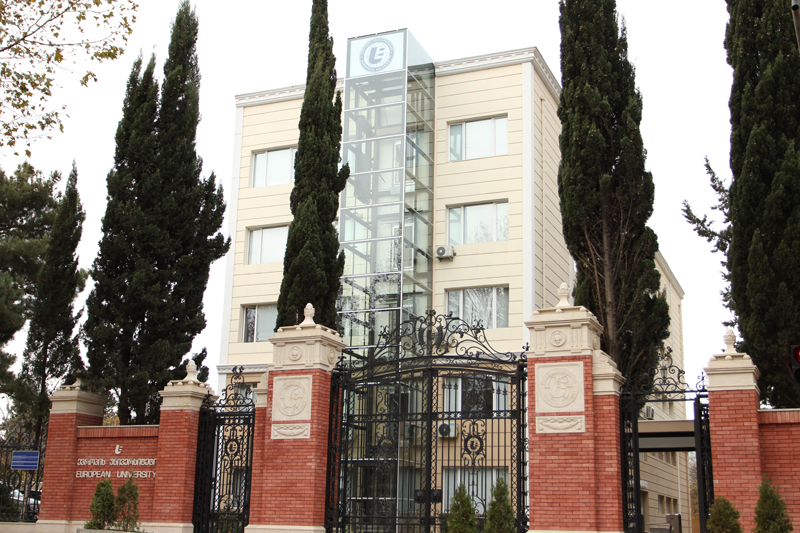University logo:

Program name: MEDICAL DOCTOR PROGRAM MD
University name: European University
Faculty: Medicine
Program supervisor: Zaza Avaliani – MD, PhD, Associate Professor
Web-page: https://eu.edu.ge/
University address: Guramishvili Ave. 76, Tbilisi 0141, Georgia
Representative email: enroll@orientcities.com
Medicine Program Overview
Undergraduate Medicine Program Curriculum is partly integrated, system-based, having both horizontally and
vertically integrated disciplines.
The spiral model implies reviewing basic subjects during senior years of study in-depth and in close
correlation with clinical subjects.
MD Programme comprises 4 phases:
Phase I – Human Body Structure and Function (I-II yrs)
The foundation Phase covers fundamental concepts about the structure and function of the human body,
the main concepts of biomedical sciences. During the first two years of study students will start learning with Introduction to the structure of Human Body, Gene, Cell and Tissue, Scientific reasoning, Clinical
and Professional Skills (Communication and Procedural skills, Medical Ethics), Medicine and Society.
These integrated modules will be taught using different teaching-learning methods and activities
(interactive lectures, role-playing, practical work, working in simulation Labs, etc). Students learn key
practical skills (interviewing patients) in clinical settings. Simulation engages students in experiential
learning; students use virtual dissection to investigate the regional anatomy of clinical cases and manage
high-fidelity mannequin case scenarios related to the regional anatomy. PBL (problem-based learning)
sessions are delivered as a longitudinal course for the Medicine program 2nd-year students.
Phase II – Mechanisms of Health and Disease (III yr)
During the Second Phase (preclinical year) the main emphasis is placed on Introduction to Clinical
Medicine (Physical Diagnosis and Clinical Skills), basic Pathology, and Pharmacology. This Phase
focuses on the most common symptoms and signs of diseases that best illustrate basic principles.
Students start mastering physical diagnosis. This year students are trained in diagnostic thinking
through case-based discussions related to different topics of medicine, integrating their knowledge and
preparing for understanding clinical subjects next year. In Professional Development longitudinal
module, they are engaged in clinical problem solving using different clinical scenarios (clinical
reasoning course) emphasizing thoughtful analysis and synthesis of information and its clinical
application.
Phase III – Core Clinical Clerkships (IV-V yrs)
During 4th and 5th years, students learn main clinical subjects (clinical rotations) – Internal Medicine
(system-based), Surgery, Obstetrics, and Gynecology, Emergency Medicine, Pediatrics, Psychiatry,
Radiology, ENT, etc. In parallel, they are continuously trained Clinical and Professional Skills
comprising professional behavior in Clinical Skills Lab and clinical settings. These modules are taught
in clinical settings (Ambulatory settings and in Hospitals). At the end of each clerkship students pass
the integrated exam (OSCE).
Phase IV – Advanced Clinical Clerkships (VI yr)
Year 6 (graduation) – during the graduating year students have clinical attachments mastering and gaining
necessary competencies in Internal Medicine, Surgery, Obstetrics/Gynecology, Infectious Diseases,
Family Medicine, Ophthalmology, Geriatrics, Pediatrics, and Emergency Medicine. According to
integration principles and spiral curriculum requirements, they revisit basic subjects (Clinical
Pharmacology and Medical Genetics). Students work in small groups and are assigned to a variety
of clinical activities in various inpatient and outpatient settings oriented to prepare graduating students for
their future specialization in residency. By the end of the year, students pass the final integrated exam
(OSCE).
MD program mandatory credits – 332 ECTS
MD program elective credits – 28 ECTS (14 ECTS – elective courses of the major field of study, 14 ECTS
- Elective/free courses)
Elective courses of the major field of study: Pain Management, Medical Management, Laboratory Medicine,
Clinical Nutrition, Allergy Medicine, Clinical Psychology, Precision Medicine, Clinical Technologies,
Sexual Medicine, Narcology.
The Aim of the Medicine Program
The aim of the program is to raise a medical professional in accordance with modern international
standards, (1) which will be able to apply principles of evidence-based medicine in practice, (2) use
relevantly principles of ethics, research, and communication in practice; (3) and be able to establish self
and continue development within constantly changing professional environment. (4)
| AVAILABLE SPECIALIZATION | THE DEGREE AWARDED | AMOUNT OF ALLOCATED ECTS | DURATION OF STUDY | THE LANGUAGE OF STUDY | ANNUAL INSTALLMENT |
|---|---|---|---|---|---|
| Medicine | Medical Doctor (MD) | 360 ECTS | 6 years, 12 semesters | English | $5 000 USD |
Additional Resources
Register Now!!! and Begin Your Journey Towards Becoming a Certified Medical Doctor!
Representative email: enroll@orientcities.com
The documents required to obtain admission:
- Copy of the passport;
- School certificate (Equivalent to A level for Undergraduate Applicants / BA degree Diploma (for MA degree applicants) along with transcript;
- Application fee payment receipt.
- Video Interview (Ask us for details of this interview)
- The student’s E-mail address and contact details





